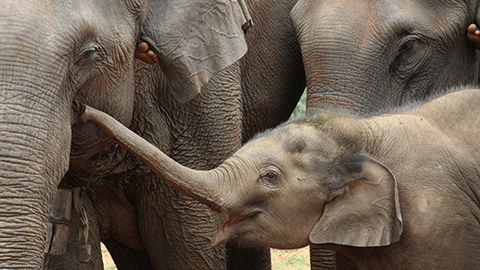Elephant Calves More Likely to Survive in the Care of Their Grandmothers
Among the Asian elephants, the grandmothers have a significant role. They ensure the survival of the calves and breeding success for their daughters.

Grandmothers often provide vital childcare in human communities across the world. In traditional societies such help even increases grandchildren’s survival prospects and leads to shorter birth intervals for the daughters. In a new study, a research group from the University of Turku in Finland has now discovered that a similar phenomenon exist among the elephants in Myanmar.
– We found that calves of young elephant mothers under 20 years of age had eight times lower mortality risk if the grandmother resided in the same location compared to calves whose grandmother was not present, says Dr. Mirkka Lahdenperä, the lead author of the study.
Resident grandmothers also decreased their daughters’ inter-birth intervals by one year, so that altogether more grandcalves were born when the grandmothers were part of the family. Grandmothers with own recent calves were as beneficial to their daughter’s calves as grandmothers who had already stopped reproducing.
– Grandmothers may be particularly important for the reproductive success of their inexperienced adult daughters. Older daughters, on the other hand, would have already gained enough experience in calf rearing to succeed without the help of their mother, says Academy Professor Virpi Lummaa.
The research group found that the more calves the grandmother had reared herself before the grandcalf was born, the better survival chances her grandcalf had. The results suggest that experience is important for the survival of the calves.
Nearly Half of Elephant Calves Kept In Zoos Die during Their First Years
Elephants have a lifespan of up to 80 years and naturally live in highly social family groups containing many generations of females and their calves. The research group studied the unique records maintained for a century on Asian elephants used in timber extraction in Myanmar.
– Our results showing the essential role of the elephant grandmothers are significant for the conservation of this endangered species. In zoos, the typical multi-generational groups are rare and animals are often moved between zoos, Dr Lahdenperä explains.
Calf mortality is very high in zoos, as up to 50% of the calves die during their first years. In addition, problems with reproduction are common.
– Experienced grandmothers might be in a pivotal role in increasing the survival prospects of calves as well as female birth rates in zoos. Conservationists and captive population managers could potentially boost the elephant population by simply starting to keep the grandmothers with their offspring, similarly as would be the case in the wild in elephant families, Professor Lummaa suggests.
The results also highlight the need to prevent poaching, especially when it targets old, large females. Their presence is crucial for the younger generation and removal of these key individuals might have severe outcomes for this endangered species. During the last few generations, the number of Asian elephants has dropped by half and only 38,500–52,500 elephants currently remain in the wild.
The study was funded by the Academy of Finland, European Research Council and Kone Foundation. The research article Nearby grandmother enhances calf survival and reproduction in Asian elephants by Mirkka Lahdenperä, Khyne U Mar, and Virpi Lummaa was published in the Scientific Reports journal.
Text: Jenni Valta
Translation: Mari Ratia
Photo: Virpi Lummaa